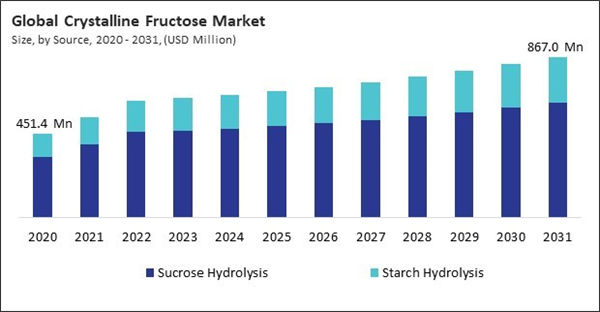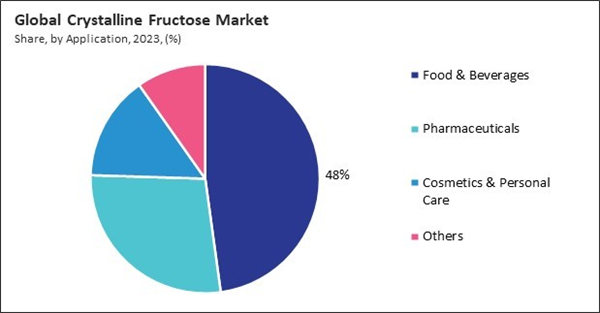As consumer awareness of health and wellness increases, a demand for low-calorie and reduced-sugar food and beverage products is growing. Crystalline fructose, with its high sweetness intensity and low glycemic index, offers manufacturers a viable alternative to traditional sugars like sucrose and high-fructose corn syrup (HFCS). Thus, the food & beverages segment is expected to capture nearly 1/2th revenue share in the market by the year 2031. Crystalline fructose enables manufacturers to reformulate existing products or develop new formulations that align with trends such as clean labels, natural ingredients, and reduced sugar content.
Sugarcane serves as a primary raw material source for crystalline fructose production. Rising consumption and production of sugarcane globally lead to increased availability of raw materials for crystalline fructose manufacturers. This availability helps stabilize supply chains, reduce production costs, and ensure consistent product availability. With the growth in sugarcane consumption and production, crystalline fructose manufacturers have opportunities to diversify their supply sources. Thus, rising consumption and sugarcane production are propelling the market's growth.
Moreover, Crystalline fructose is approximately 1.7 times sweeter than sucrose (table sugar). This high sweetness intensity allows manufacturers to achieve desired sweetness levels in products with lower usage amounts. As a result, products formulated with crystalline fructose can potentially reduce overall sugar content while maintaining sweetness, appealing to health-conscious consumers seeking reduced-calorie options. Crystalline fructose has a lower glycemic index (GI) than sucrose and glucose. Hence, high sweetness and low glycemic index drive the market's growth.
However, crystalline fructose, like other forms of fructose, has been investigated for its potential correlation with metabolic disorders, including obesity, diabetes, insulin resistance, and cardiovascular disease, due to excessive consumption. High fructose intake can contribute to increased triglyceride levels, liver fat accumulation, and elevated uric acid levels, risk factors for these conditions. Media coverage and health-related studies have driven increased public awareness of health issues associated with high fructose consumption. Therefore, health concerns and negative perceptions are hampering the market's growth.
Driving and Restraining Factors
Drivers- Rising Consumption and Production of Sugarcane
- High Sweetness and Low Glycemic Index
- Expansion Of the Food and Beverage Industry
- Health Concerns and Negative Perception
- Complexity In Product Formulation
- Expanding Applications in Pharmaceuticals
- Growing Applications in Pet Foods
- Competitive Pressure from Alternatives
- Storage And Handling Considerations
Application Outlook
On the basis of application, the market is classified into food & beverages, pharmaceuticals, cosmetics & personal care, and others. The food & beverages segment recorded 48% revenue share in the market in 2023. Crystalline fructose is about 1.7 times sweeter than sucrose. This high sweetness intensity allows manufacturers to use smaller quantities to achieve the desired level of sweetness, reducing the overall sugar content in products. This is especially advantageous in formulations where calorie reduction is a priority.Source Outlook
Based on source, the market is divided into sucrose hydrolysis and starch hydrolysis. The starch hydrolysis segment attained 27% revenue share in the market in 2023. The hydrolysis of starch not only produces fructose but also yields other valuable by-products like glucose and maltose. These by-products can be used in various food and industrial applications, adding value to the production process and improving overall profitability. The hydrolysis of starch not only produces fructose but also yields other valuable by-products like glucose and maltose.Regional Outlook
Region-wise, the market is analyzed across North America, Europe, Asia Pacific, and LAMEA. The North America region witnessed 40% revenue share in the market in 2023. North America, particularly the United States, has a high consumption rate of processed foods and beverages. This region's food and beverage industry extensively uses sweeteners, including crystalline fructose, to meet consumer preferences for sweet-tasting products.List of Key Companies Profiled
- Xiwang Group Co., Ltd.
- Roquette Freres SA
- Tate & Lyle Plc
- Archer Daniels Midland Company
- DuPont de Nemours, Inc.
- Foodchem International Corporation
- Galam Ltd.
- Cargill, Incorporated
- Bell Chem Corp.
- Atlantic Chemicals Trading GmbH
Market Report Segmentation
By Source- Sucrose Hydrolysis
- Starch Hydrolysis
- Food & Beverages
- Pharmaceuticals
- Cosmetics & Personal Care
- Others
- North America
- US
- Canada
- Mexico
- Rest of North America
- Europe
- Germany
- UK
- France
- Russia
- Spain
- Italy
- Rest of Europe
- Asia Pacific
- China
- Japan
- India
- South Korea
- Singapore
- Malaysia
- Rest of Asia Pacific
- LAMEA
- Brazil
- Argentina
- UAE
- Saudi Arabia
- South Africa
- Nigeria
- Rest of LAMEA
Table of Contents
Companies Mentioned
- Xiwang Group Co., Ltd.
- Roquette Freres SA
- Tate & Lyle Plc
- Archer Daniels Midland Company
- DuPont de Nemours, Inc.
- Foodchem International Corporation
- Galam Ltd.
- Cargill, Incorporated
- Bell Chem Corp.
- Atlantic Chemicals Trading GmbH










